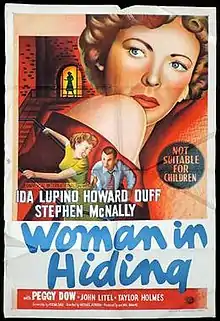| Woman in Hiding | |
|---|---|
 Theatrical release poster | |
| Directed by | Michael Gordon |
| Screenplay by | Oscar Saul Roy Huggins (adaptation) |
| Based on | the SEP story "Fugitive from Terror" by James Webb |
| Produced by | Michael Kraike |
| Starring | Ida Lupino Stephen McNally Howard Duff |
| Cinematography | William H. Daniels |
| Edited by | Milton Carruth |
| Color process | Black and white |
Production company | Universal International Pictures |
| Distributed by | Universal Pictures |
Release date |
|
Running time | 92 minutes |
| Country | United States |
| Language | English |
Woman in Hiding is a 1950 American film noir crime film directed by Michael Gordon and starring Ida Lupino, Stephen McNally and Howard Duff.[1][2][3][4]
Plot
Deborah Chandler Clark watches police drag a North Carolina river for her body. She recounts the events that brought her to this, beginning when her father, a mill owner, disapproved of a romance between Deborah and the mill's general manager, Selden Clark.
Her father falls to his death at the mill. Selden consoles her and proposes. On their honeymoon, a jealous and angry woman named Patricia Monahan turns up and claims she's been romantically involved with Selden, insisting he married Deborah simply to gain control of her mill.
Deborah demands an annulment of the marriage. While leaving, the brakes fail on her car. She leaps out just before it crashes into the river. Believing she would be unable to prove her husband's guilt, Deborah disappears, moving to Knoxville and going by the name Ann Carter.
An ex-soldier, Keith Ramsey, seems interested in Ann and follows her. What he's really interested in is a $5,000 reward offered by her husband. At a hotel hosting a crowded convention, Selden nearly succeeds in killing his wife. Keith finally realizes that Deborah is in genuine danger.
Patricia can confirm her story, so Deborah tracks her down. Patricia betrays her, however, still being in love with Selden. At the mill, he attempts to throw Deborah to her death the same way he murdered her father. In the darkness, he mistakenly kills Patricia instead. Selden and Keith enter a life-or-death struggle by a ledge, which is interrupted when Selden is so shocked to see Deborah still alive that he falls to his death. Deborah and Keith later get married.
Cast
- Ida Lupino as Deborah Chandler Clark
- Stephen McNally as Selden Clark
- Howard Duff as Keith Ramsey
- Peggy Dow as Patricia Monahan
- John Litel as John Chandler
- Taylor Holmes as Lucius Maury
- Irving Bacon as Link
- Don Beddoe as Fat Salesman
- Joe Besser as Salesman with Drum
Reception
When released, critic Bosley Crowther gave the film a mostly positive review. He wrote, "Although it never pretends to be anything but melodrama, Woman in Hiding, unlike so many offerings in this genre, adds some convincing characterizations to its suspense. The combination of the two attributes succeeds in raising this new arrival at the Criterion a notch or two above the normal in this category emanating from the Coast. And, aside from a climax which is something less than inspired, Michael Gordon's direction of this story of a newlywed's desperate flight from her homicidal husband is paced toward mounting tension despite some implausible aspects here and there."[5]
Film critic Dennis Schwartz called the film a "Patchy melodrama." He wrote, "Patchy melodrama with too many contrived suspense escape scenes and too pat an ending to be anything better than a modest thriller, but Ida Lupino as the damsel-in-distress is terrific. Michael Gordon (Pillow Talk/Boys' Night Out/Cyrano de Bergerac) directs in a workmanlike and capable way."[6]
References
- ↑ Woman in Hiding at the American Film Institute Catalog.
- ↑ Borde, Raymond; Chaumeton, Etienne (2002). A Panorama of American Film Noir (1941-1953). City Lights Books. p. 87. ISBN 9780872864122. Retrieved 15 November 2019.
- ↑ Brookes, Ian (2017). Film Noir: A Critical Introduction. Bloomsbury Publishing USA. p. 131. ISBN 9781780933245. Retrieved 15 November 2019.
- ↑ Stephens, Michael L. (2015). Art Directors in Cinema: A Worldwide Biographical Dictionary. McFarland. p. 165. ISBN 9781476611280. Retrieved 15 November 2019.
- ↑ Crowther, Bosley. The New York Times, film review, February 23, 1950. Accessed: July 23, 2013.
- ↑ Schwartz, Dennis. Ozus' World Movie Reviews, film review, December 20, 2012. Accessed: July 23, 2013.